I Second Wanting Prints Of These
I second wanting prints of these









Alejandro Guijarro photographs the chalkboards of some of the brightest minds in quantum physics for his continuing series Momentum. He went to research facilities like CERN and many of the top universities in the world to find them.
More Posts from Stubborn-turtle-blog and Others
Way more adorable than drones

Starting in July, 2016, millions of people will encounter single-minded little autonomous robots in the United Kingdom, Germany, and Switzerland as part of the testing program launched by London-based Starship Technologies in tandem with some major industry partners. This launch is a first-of-its kind fleet of autonomous robots, designed to deliver goods within a two- to three-mile radius of a hub and arrive within 15 to 30 minutes.
The robots drive autonomously but are monitored by humans who can take over control at any time. Launched by two Skype cofounders, Ahti Heinla and Janus Friis, Starship Technologies’ aim is to fundamentally reshape how goods are shipped and delivered, and make local delivery almost free.
And the dancer notes the ballroom














$1,200,000/11 br
Weatherford, TX




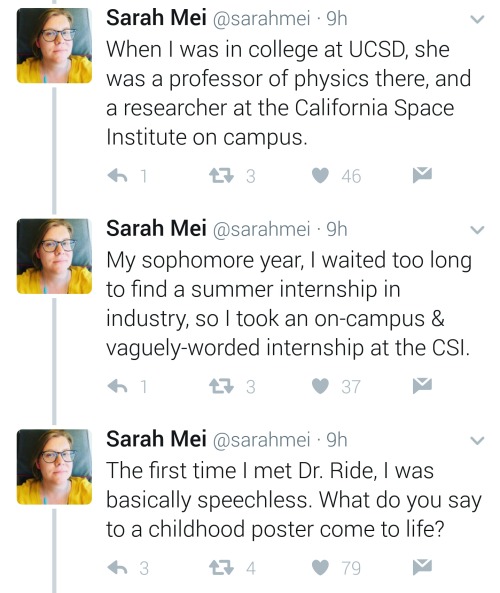
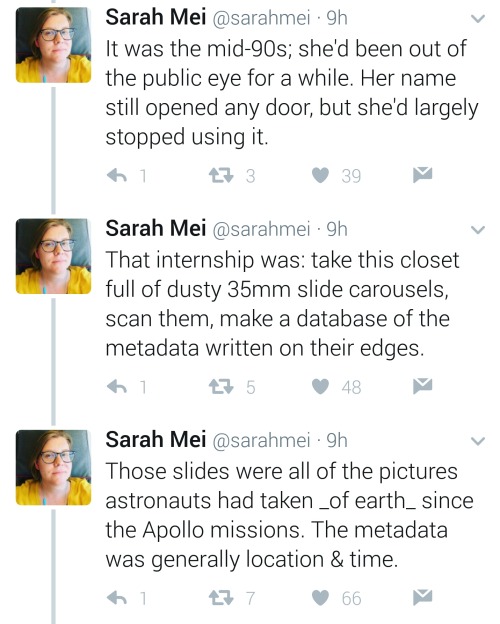
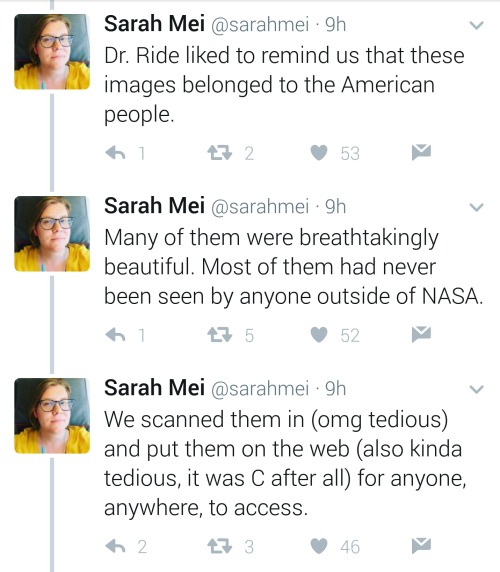

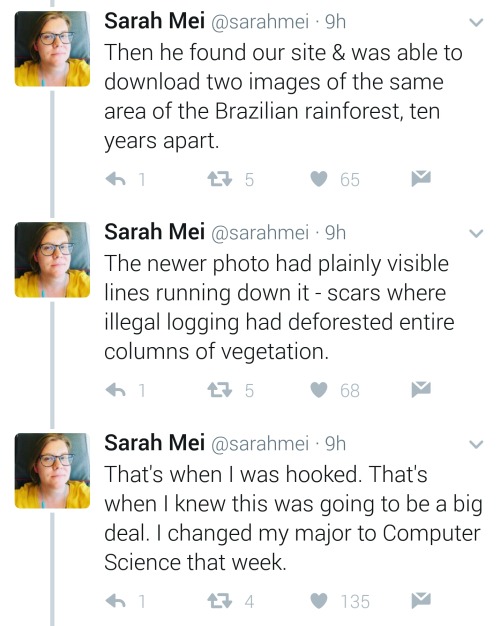
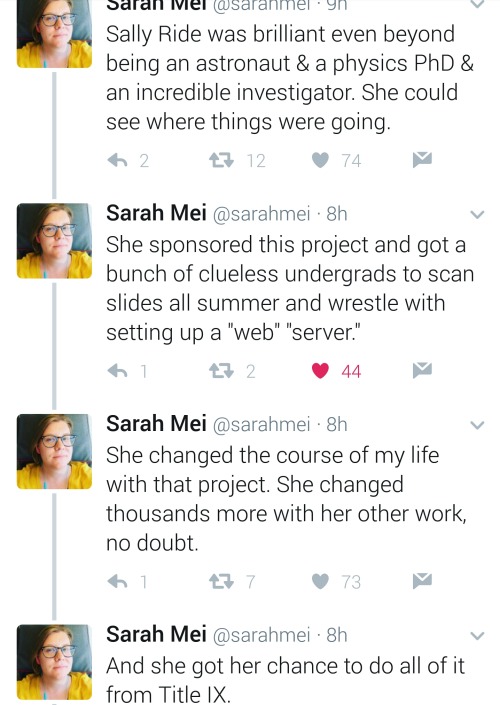
Equal opportunity benefits can be far-reaching
https://twitter.com/sarahmei/status/818682610712866817
So, what I'm getting is metric vs. imperial is a states' right issue
The United States, much to my own surprise, does use the metric system. But only at the Federal level. The Drug Enforcement Administration seizes kilos of cocaine. Soldiers determine distance by “klicks” or kilometers. The Federal Government of the United States officially works in metric. Adoption of the metric system over the imperial system was left up to the individual state governments, who chose freedom (and not having to pay to re-survey all their land).
![Yikes! [http://imgur.com/0mHJob3]](https://64.media.tumblr.com/64b1e17ce0a209744bc5d5590c95b597/tumblr_ohxss5q1c51s04h2ho1_500.jpg)
Yikes! [http://imgur.com/0mHJob3]

This is the Bandigara Escarpment, in Mali. Although the cliffs have been inhabited since the 200s BCE, the present inhabitatants, the Dogon, have been in the rock-perched houses since the 1300s CE. The cliffs offer protection, cooler air, and a safe place to bury the dead. The valley below is prone to flash floods. This means building houses there, and burying dead there, is a risky proposition. The Dogon decided the risk was not worth it, and drove out the former inhabitants of the Bandigara Escarpment. Since the 1300s they have lived at Bandigara in relative peace.
Space Station Science: Biological Research

Each month, we highlight a different research topic on the International Space Station. In August, our focus is biological research. Learning how spaceflight affects living organisms will help us understand potential health risks related to humans on long duration missions, including our journey to Mars.

Cells, microbes, animals and plants are affected by microgravity, and studying the processes involved in adaptation to spaceflight increases our fundamental understanding of biological processes on Earth. Results on Earth from biological research in space include the development of new medications, improved agriculture, advancements in tissue engineering and regeneration, and more.
Take a look at a few of the biological research experiments performed on space station:
Biomolecule Sequencer

Living organisms contain DNA, and sequencing DNA is a powerful way to understand how they respond to changing environments. The Biomolecule Sequencer experiment hopes to demonstrate (for the first time) that DNA sequencing is feasible in an orbiting spacecraft. Why? A space-based DNA sequencer could identify microbes, diagnose diseases and understand crew member health, and potentially help detect DNA- based life elsewhere in the solar system.
Ant-stronauts

Yes, ant-stronauts…as in ants in space. These types of studies provide insights into how ants answer collective search problems. Watching how the colony adapts as a unit in the quest for resources in extreme environments, like space, provides data that can be used to build algorithms with varied applications. Understanding how ants search in different conditions could have applications for robotics.
TAGES

The TAGES experiment (Transgenic Arabidopsis Gene Expression System) looks to see how microgravity impacts the growth of plant roots. Fluorescent markers placed on the plant’s genes allow scientists to study root development of Arabidopsis (a cress plant) grown on the space station. Evidence shows that directional light in microgravity skews root growth to the right, rather than straight down from the light source. Root growth patters on station mimic that of plants grown at at 45% degree angle on Earth. Space flight appears to slow the rate of the plant’s early growth as well.
Heart Cells

Spaceflight can cause a suite of negative health effects, which become more problematic as crew members stay in orbit for long periods of time. Effects of Microgravity on Stem Cell-Derived Cardiomycytes (Heart Cells) studies the human heart, specifically how heart muscle tissue contracts, grows and changes in microgravity. Understanding how heart muscle cells change in space improves efforts for studying disease, screening drugs and conducting cell replacement therapy for future space missions.
Medaka Fish

Chew on these results…Jaw bones of Japanese Medaka fish in microgravity show decreased mineral density and increased volume of osteoclasts, cells that break down bone tissue. Results from this study improve our understanding of the mechanisms behind bone density and organ tissue changes in space.
These experiments, and many others, emphasize the importance of biological research on the space station. Understanding the potential health effects for crew members in microgravity will help us develop preventatives and countermeasures.
Make sure to follow us on Tumblr for your regular dose of space: http://nasa.tumblr.com
It’s Friday...Come Space Out with Us
It’s Friday…which seems like a great excuse to take a look at some awesome images from space.
First, let’s start with our home planet: Earth.

This view of the entire sunlit side of Earth was taken from one million miles away…yes, one MILLION! Our EPIC camera on the Deep Space Climate Observatory captured this image in July 2015 and the picture was generated by combining three separate images to create a photographic-quality image.
Next, let’s venture out 4,000 light-years from Earth.

This image, taken by the Hubble Space Telescope, is not only stunning…but shows the colorful “last hurrah” of a star like our sun. This star is ending its life by casting off its outer layers of gas, which formed a cocoon around the star’s remaining core. Our sun will eventually burn out and shroud itself with stellar debris…but not for another 5 billion years.
The material expelled by the star glows with different colors depending on its composition, its density and how close it is to the hot central star. Blue samples helium; blue-green oxygen, and red nitrogen and hydrogen.
Want to see some rocks on Mars?

Here’s an image of the layered geologic past of Mars revealed in stunning detail. This color image was returned by our Curiosity Mars rover, which is currently “roving” around the Red Planet, exploring the “Murray Buttes” region.
In this region, Curiosity is investigating how and when the habitable ancient conditions known from the mission’s earlier findings evolved into conditions drier and less favorable for life.
Did you know there are people currently living and working in space?

Right now, three people from three different countries are living and working 250 miles above Earth on the International Space Station. While there, they are performing important experiments that will help us back here on Earth, and with future exploration to deep space.
This image, taken by NASA astronaut Kate Rubins shows the stunning moonrise over Earth from the perspective of the space station.
Lastly, let’s venture over to someplace REALLY hot…our sun.

The sun is the center of our solar system, and makes up 99.8% of the mass of the entire solar system…so it’s pretty huge. Since the sun is a star, it does not have a solid surface, but is a ball of gas held together by its own gravity. The temperature at the sun’s core is about 27 million degrees Fahrenheit (15 million degrees Celsius)…so HOT!
This awesome visualization appears to show the sun spinning, as if stuck on a pinwheel. It is actually the spacecraft, SDO, that did the spinning though. Engineers instructed our Solar Dynamics Observatory (SDO) to roll 360 degrees on one axis, during this seven-hour maneuver, the spacecraft took an image every 12 seconds.
This maneuver happens twice a year to help SDO’s imager instrument to take precise measurements of the solar limb (the outer edge of the sun as seen by SDO).
Thanks for spacing out with us…you may now resume your Friday.
Make sure to follow us on Tumblr for your regular dose of space: http://nasa.tumblr.com
Evolutionary programming is a blast to watch
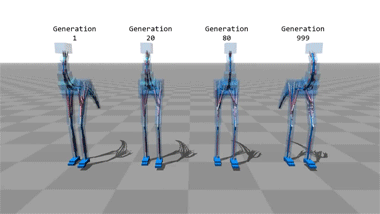
These computer programs taught themselves how to walk.
Generation 80 don’t give a shit.
-
 a-lo reblogged this · 1 month ago
a-lo reblogged this · 1 month ago -
 solskip reblogged this · 2 months ago
solskip reblogged this · 2 months ago -
 luce-goose reblogged this · 2 months ago
luce-goose reblogged this · 2 months ago -
 luce-goose liked this · 2 months ago
luce-goose liked this · 2 months ago -
 trash-burn reblogged this · 2 months ago
trash-burn reblogged this · 2 months ago -
 hier-himmel liked this · 4 months ago
hier-himmel liked this · 4 months ago -
 vampirismi liked this · 6 months ago
vampirismi liked this · 6 months ago -
 anna1xy47 liked this · 7 months ago
anna1xy47 liked this · 7 months ago -
 beanzbox reblogged this · 7 months ago
beanzbox reblogged this · 7 months ago -
 higher-dimensional-consciousness reblogged this · 7 months ago
higher-dimensional-consciousness reblogged this · 7 months ago -
 rocket-angel reblogged this · 7 months ago
rocket-angel reblogged this · 7 months ago -
 chaosgenasi liked this · 8 months ago
chaosgenasi liked this · 8 months ago -
 yourmoirail liked this · 8 months ago
yourmoirail liked this · 8 months ago -
 dykejet liked this · 8 months ago
dykejet liked this · 8 months ago -
 parts-of-me-unravelling liked this · 8 months ago
parts-of-me-unravelling liked this · 8 months ago -
 planethobbit reblogged this · 8 months ago
planethobbit reblogged this · 8 months ago -
 goldenaltar reblogged this · 8 months ago
goldenaltar reblogged this · 8 months ago -
 ithappenseverytime reblogged this · 9 months ago
ithappenseverytime reblogged this · 9 months ago -
 ithappenseverytime liked this · 9 months ago
ithappenseverytime liked this · 9 months ago -
 wirelychee reblogged this · 9 months ago
wirelychee reblogged this · 9 months ago -
 jumpingthesefences reblogged this · 10 months ago
jumpingthesefences reblogged this · 10 months ago -
 mixedcontents liked this · 10 months ago
mixedcontents liked this · 10 months ago -
 argyrocratie reblogged this · 10 months ago
argyrocratie reblogged this · 10 months ago -
 valorfaerie reblogged this · 10 months ago
valorfaerie reblogged this · 10 months ago -
 trash-burn liked this · 10 months ago
trash-burn liked this · 10 months ago -
 waxedpaperdoor reblogged this · 10 months ago
waxedpaperdoor reblogged this · 10 months ago -
 realisaonum reblogged this · 10 months ago
realisaonum reblogged this · 10 months ago -
 originalromanticsir liked this · 10 months ago
originalromanticsir liked this · 10 months ago -
 southern-man liked this · 10 months ago
southern-man liked this · 10 months ago -
 nxt2u2 reblogged this · 10 months ago
nxt2u2 reblogged this · 10 months ago -
 jupiterovprsten liked this · 10 months ago
jupiterovprsten liked this · 10 months ago -
 nxt2u2 liked this · 10 months ago
nxt2u2 liked this · 10 months ago -
 in0ctobercountry reblogged this · 10 months ago
in0ctobercountry reblogged this · 10 months ago -
 weirdfangirl1998 liked this · 10 months ago
weirdfangirl1998 liked this · 10 months ago -
 synthsdistantly reblogged this · 10 months ago
synthsdistantly reblogged this · 10 months ago -
 symbolicscreaming reblogged this · 10 months ago
symbolicscreaming reblogged this · 10 months ago -
 jumpingthesefences liked this · 11 months ago
jumpingthesefences liked this · 11 months ago -
 brilliantdisguises reblogged this · 11 months ago
brilliantdisguises reblogged this · 11 months ago -
 blossoms-and-petrichor reblogged this · 11 months ago
blossoms-and-petrichor reblogged this · 11 months ago -
 blossomsandpetrichor liked this · 11 months ago
blossomsandpetrichor liked this · 11 months ago -
 sunderedstar liked this · 11 months ago
sunderedstar liked this · 11 months ago -
 mkstrigidae liked this · 11 months ago
mkstrigidae liked this · 11 months ago -
 4gottenname reblogged this · 11 months ago
4gottenname reblogged this · 11 months ago -
 4gottenname liked this · 11 months ago
4gottenname liked this · 11 months ago -
 maikelfist reblogged this · 11 months ago
maikelfist reblogged this · 11 months ago -
 wigglybunfish liked this · 11 months ago
wigglybunfish liked this · 11 months ago -
 chambergambit reblogged this · 11 months ago
chambergambit reblogged this · 11 months ago
Gaming, Science, History, Feminism, and all other manners of geekery. Also a lot of dance
243 posts